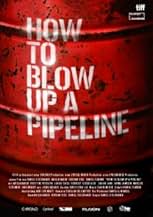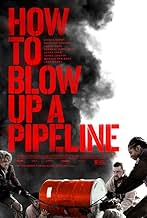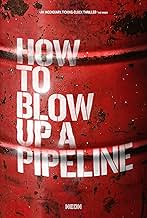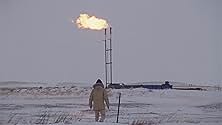A crew of environmental activists plot a daring plan to disrupt an oil pipeline.A crew of environmental activists plot a daring plan to disrupt an oil pipeline.A crew of environmental activists plot a daring plan to disrupt an oil pipeline.
- Awards
- 5 wins & 16 nominations total
Featured reviews
How To Blow Up A Pipeline is sold as a crackling environmental thriller with a message. The fact that it presents the message it has with a hammer doesn't hide the fact that as a film it is just shallow. It is exactly what the title says. It's about a group of climate change activists that plan and carry out the disabling of an oil pipeline in Texas. The problem is that the characters are paper thin. They are just a collection of grievances and slogans, not three dimensional people. I have watched many films like this where I may not agree with the cause or politics of the characters but at least in better movies of this kind I can relate or at least empathize with at least one or some of them. Even though this film uses flashbacks to set up the characters you don't get to know any of them. Those scenes are used to set up and justify their actions which we know is the blowing up of the pipeline. There is no suspense because I didn't care for characters. They are just stereotypes as opposed to fleshed out characters. Each character seems like a bumper sticker representing a particular grievance. This film wants the audience to think about how deep the message is but fails to create compelling characters to support the ambitions of their message.
The film is well made but is content with not really delving into the subject it wants to represent. The filmmakers sabotage their own message by being so superficial.
Grade: C-
The film is well made but is content with not really delving into the subject it wants to represent. The filmmakers sabotage their own message by being so superficial.
Grade: C-
Recently, when a bunch of "Just Stop Oil" activists disturbed a World Snooker Championship game and, as per Gen-Z-climate-activist tradition, threw food all over the tables and sat themselves down in their anti-oil garments, a Twitter user quipped: "These types of climate protests are so detrimental to raising actual awareness and widespread support that if it ever came out that these people were paid for by gas and coal-owning billionaires I'd probably believe it".
Now, I don't know if the companies behind the well-made but questionable How to Blow Up a Pipeline have any such dubious ties (neither the production companies nor the distributor, Neon, have any deals with Big Oil that I could find). But man, what a time to do a psyop to make the enemy look deranged when said enemy will agree with the assessment and be proud of it!
Here is a movie loosely based on a book -- whose name-similarity to some kinda Dark Web instruction manual isn't accidental -- that speaks straight-out about how violence is a necessity for "climate justice"; essentially how destruction is correct so long as it's (purportedly) in the name of the right cause. I guess I shouldn't be too shocked. It was racism in 2020, it's climate change now; I just thought it was gonna be less mask-off terror apologia and more trying to rationalize throwing soup at art to make fossil fuels go away.
Then again, the book predates all those incidents and this manner of disruption was fairly commonplace in Sweden, the author's homeland, before the big vandalism stories of recent UK and US news. Perhaps the real surprise is that it came out after the Nord Stream incident -- an as-yet-unresolved case (of POSSIBLE eco-terrorism) that damaged decidedly more than "replaceable property" (what many radicals will tell you is the only real victim, even on a bad day). Not that this ever really stopped at "property", especially among the new wave of post-Thunberg soup Zoomers.
I sometimes ask: If, for example, a patient dies inside an ambulance as a result of road-blocking climate protestors -- as has literally happened in, you guessed it, Sweden a few months ago -- is that person deemed a necessary sacrifice for the utopia? After all, what's one death vs. The doomsday you've been told you're preventing? Do you redirect the trolley to kill one human when there are 8 billion hypothetical humans on the other track?
I accuse people of pussyfooting around this query, but I realize they've been answering me through actions for some time. When activists were convicted for the incident in Sweden, there were additional manifestations -- not in the name of the person that died, but the ones that got arrested.
Will a film like this exacerbate things? Hopefully not. It's being praised by the Usual Journalists for portraying the "terrorists" (sometimes in quotes, sometimes not) in a sympathetic light, but I didn't read them as outright unblemished. Someone will go "This was my Joker" but someone always does.
Now, I don't know if the companies behind the well-made but questionable How to Blow Up a Pipeline have any such dubious ties (neither the production companies nor the distributor, Neon, have any deals with Big Oil that I could find). But man, what a time to do a psyop to make the enemy look deranged when said enemy will agree with the assessment and be proud of it!
Here is a movie loosely based on a book -- whose name-similarity to some kinda Dark Web instruction manual isn't accidental -- that speaks straight-out about how violence is a necessity for "climate justice"; essentially how destruction is correct so long as it's (purportedly) in the name of the right cause. I guess I shouldn't be too shocked. It was racism in 2020, it's climate change now; I just thought it was gonna be less mask-off terror apologia and more trying to rationalize throwing soup at art to make fossil fuels go away.
Then again, the book predates all those incidents and this manner of disruption was fairly commonplace in Sweden, the author's homeland, before the big vandalism stories of recent UK and US news. Perhaps the real surprise is that it came out after the Nord Stream incident -- an as-yet-unresolved case (of POSSIBLE eco-terrorism) that damaged decidedly more than "replaceable property" (what many radicals will tell you is the only real victim, even on a bad day). Not that this ever really stopped at "property", especially among the new wave of post-Thunberg soup Zoomers.
I sometimes ask: If, for example, a patient dies inside an ambulance as a result of road-blocking climate protestors -- as has literally happened in, you guessed it, Sweden a few months ago -- is that person deemed a necessary sacrifice for the utopia? After all, what's one death vs. The doomsday you've been told you're preventing? Do you redirect the trolley to kill one human when there are 8 billion hypothetical humans on the other track?
I accuse people of pussyfooting around this query, but I realize they've been answering me through actions for some time. When activists were convicted for the incident in Sweden, there were additional manifestations -- not in the name of the person that died, but the ones that got arrested.
Will a film like this exacerbate things? Hopefully not. It's being praised by the Usual Journalists for portraying the "terrorists" (sometimes in quotes, sometimes not) in a sympathetic light, but I didn't read them as outright unblemished. Someone will go "This was my Joker" but someone always does.
Do the ends truly justify the means? That's an age-old question that has been asked countless times in countless contexts, but what's the answer? That's a decision left open for viewers to ponder in this taut ecothriller about a group of zealous environmental activists who plan to blow up a west Texas pipeline in an effort to draw attention to such issues as global climate change and public health considerations. Writer-director Daniel Goldhaber's second feature skillfully combines elements of various cinematic genres, including Westerns, heist films, political thrillers and ecological dramas like "The East" (2013), but it does so in some highly unexpected ways. In particular, this well-constructed, smartly produced offering is heavily character-driven, presenting genuinely compelling back stories about its crew of protagonists told through a series of strategically placed flashbacks. What's more, the picture's gorgeous cinematography, superb editing, fine performances and intense original score all lend themselves to a splendidly crafted package, certainly much more than what one would typically expect out of a low-budget indie. Of course, these strengths aside, this still leaves open the question about the impact of this story. What kind of message does it send? Is it appropriate to make and release a picture that depicts such a subversive venture such as this? Can the kind of collateral damage at stake here be justified, be it even theoretically told through a work of fiction? But, then, can society continue to willfully ignore the kinds of environmental damage that are being allowed to unfold without taking any meaningful action? And what of the law enforcement questions involved in a scenario like this? "Pipeline" gives viewers ample food for thought while simultaneously reminding us that the clock is ticking on these issues - and that we had better start making some serious decisions soon.
It's a tense movie with some good moments, interesting cinematography, and an even better score. However, it didn't live up to the high expectations.
Even I, who agree with the main message, found it to be too one-sided. Other perspectives are not heard, there are no arguments, no pros and cons (when there are - and only about the method - a conclusion is quickly reached). I like movies that make me reflect and not movies that feed me the message with a spoon, forcing me to accept that. The structure is interesting, although cutting the tension doesn't always have the desired effect (which I believe is the same as a cliffhanger on tv shows). Lastly, the characters are too linear, too victimized. We know almost nothing about what sets them apart, we are only left with their motivations - all with direct causes - to do what they want to do. Ok, but didn't make me care a lot about them.
It's an ok, flawed, somewhat interesting little thriller with an important message, but that's all it is.
Even I, who agree with the main message, found it to be too one-sided. Other perspectives are not heard, there are no arguments, no pros and cons (when there are - and only about the method - a conclusion is quickly reached). I like movies that make me reflect and not movies that feed me the message with a spoon, forcing me to accept that. The structure is interesting, although cutting the tension doesn't always have the desired effect (which I believe is the same as a cliffhanger on tv shows). Lastly, the characters are too linear, too victimized. We know almost nothing about what sets them apart, we are only left with their motivations - all with direct causes - to do what they want to do. Ok, but didn't make me care a lot about them.
It's an ok, flawed, somewhat interesting little thriller with an important message, but that's all it is.
Up until this film I had never heard of the book How to Blow Up a Pipeline nor of it's author, Andreas Malm but this Swedish writer and associate professor has been preaching the 'joys' of environmentalists taking direct action to property for awhile. Is this fictional depiction of his writing a good summary of Malm's thoughts? It would appear so.
Of course, that doesn't make the movie good. What does make it worth a watch is how the planning and execution of this act of violence (or self defense) is portrayed. The director, Daniel Goldhaber, has given us a very decent thriller. Yes, the characters are not terribly deep but if you enjoy watching smart people figure out a heist, well in this case an explosion, then this is the film for you. Also, to have a film made in America that is basically pro-terror attack 22 years after 9/11 makes for fascinating viewing. Who would have ever guessed this day would ever come?
Should this film get any push back I have no doubt you'll hear some denounce the picture by saying brute force is not the answer. The problem with that argument is that cinema has been celebrating violence against people (See any action movie, cop film or western) for years so why not one about violence against oil pipelines?
Of course, that doesn't make the movie good. What does make it worth a watch is how the planning and execution of this act of violence (or self defense) is portrayed. The director, Daniel Goldhaber, has given us a very decent thriller. Yes, the characters are not terribly deep but if you enjoy watching smart people figure out a heist, well in this case an explosion, then this is the film for you. Also, to have a film made in America that is basically pro-terror attack 22 years after 9/11 makes for fascinating viewing. Who would have ever guessed this day would ever come?
Should this film get any push back I have no doubt you'll hear some denounce the picture by saying brute force is not the answer. The problem with that argument is that cinema has been celebrating violence against people (See any action movie, cop film or western) for years so why not one about violence against oil pipelines?
Did you know
- TriviaMalm's book (How to Blow Up a Pipeline) is a work of nonfiction that uses a history of social justice movements to argue that property destruction should be considered a valid tactic in the pursuit of environmental justice.
- ConnectionsFeatures SPY×FAMILY (2022)
- SoundtracksChamomile
Written, Performed, and Produced by Cameron Burt (as Winslow Leach)
- How long is How to Blow Up a Pipeline?Powered by Alexa
Details
- Release date
- Country of origin
- Official site
- Language
- Also known as
- How to Blow Up A Pipeline
- Filming locations
- Production companies
- See more company credits at IMDbPro
Box office
- Gross US & Canada
- $750,010
- Opening weekend US & Canada
- $115,453
- Apr 9, 2023
- Gross worldwide
- $1,046,811
- Runtime1 hour 44 minutes
- Color
- Aspect ratio
- 1.78 : 1
Contribute to this page
Suggest an edit or add missing content









































